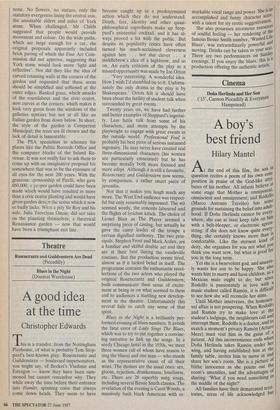Theatre
Rosencrantz and Guildenstern Are Dead (Piccadilly) Blues in the Night (Donmar Warehouse)
A good idea at the time
Christopher Edwards
This is a transfer, from the Nottingham Playhouse, of what is probably Tom Stop- pard's best-known play. Rosencrantz and Guildenstern — boulevard impersonators, you might say, of Becket's Vladimir and Estragon — know they have been sum- moned but cannot remember why. They while away the time before their entrance into Hamlet, spinning coins that always come down heads. They seem to have become caught up in a predetermined action which they do not understand. Death, fate, identity and other quasi- philosophical ingredients make up Stop- pard's existential cocktail, and it has al- ways proved a hit with the public. But despite its popularity critics have often turned his much-acclaimed cleverness against him . . . not that clever . . . a middlebrow's idea of a highbrow, and so on. An early criticism of the play as a missed opportunity was made by Joe Orton . . . 'Very interesting. A wonderful idea. How I wish I'd stumbled on to it. Unfortu- nately the only drama in the play is by Shakespeare.' Orton felt it should have been about the futility of student talk when surrounded by great events.
Twenty years on, we have had further and better examples of Stoppard's ingenui- ty. Less futile talk from some of his characters, and more attempts by the playwright to engage with great events in the outside world. Professional Foul is probably his best piece of serious sustained ingenuity. He may never have created real three-dimensional characters (his women are particularly emaciated) but he has become morally both more focused and more adept. Although it is still a favourite, Rosencrantz and Guildenstern now seems, by comparison, a rather smart piece of juvenilia. Not that it makes you laugh much any more. The West End audience was respect- ful but only reasonably impressed. The wit seemed wordy, the conceits laboured and the flights of lyricism kitsch. The choice of Lionel Blair as The Player seemed a surprising piece of casting, but actually he gave the camp leader of the troupe a certain dignified authority. The two prin- cipals, Stephen Frost and Mark Arden, are a familiar and skilful double act and they are at their best during the vaudeville routines. But the production seems tired, almost as if it lacked belief in itself. The programme contains the enthusiastic recol- lections of the two actors who played the original Rosencrantz and Guildenstern; both communicate their sense of excite- ment at being in on what seemed to them and to audiences a startling new develop- ment in the theatre. Unfortunately this revival fails to catch any sense of that spirit.
Blues in the Night is a brilliantly per- formed evening of blues numbers. It avoids the fatal error of Lady Sings The Blues, which was to try to put together a convinc- ing narrative to link up the songs. In a seedy Chicago hotel in the 1930s, we meet three women (all of whom have reason to sing the blues) and one man — who stands as the representative cause of all their woes. The themes are the usual ones: sex, gloom, rejection, drunkenness, loneliness, etc. There are 26 superbly sung songs, including several Bessie Smith classics. The revelation of the evening is Carol Woods, a massively built black American with re- markable vocal range and power. She is all accomplished and funny character actor, with a talent for sly erotic suggestiveness' She also possesses enormous resources of soulful feeling — her rendering of the famous Bessie Smith number, 'Wasted LlfAe Blues', was extraordinarily powerful and moving. Drinks can be taken to your seat. There are two performances on Sund. aY evenings. If you enjoy the blues, this is a production offering the authentic article.









































































 Previous page
Previous page